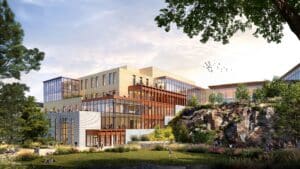Seeking to build a new consolidated campus, a North Shore life science company is tackling the question of how to design power-hungry lab buildings with minimal fossil fuel consumption.
At an abandoned quarry in Manchester-by-the-Sea, Cell Signaling Technology plans to tap into the underground terrain for a geothermal heating and cooling system for its proposed 250,000-square-foot development.
The company’s founder and CEO, Manchester-by-the-Sea resident Michael Comb, was determined to demonstrate the company’s environmental commitment through a sustainable real estate development, Chief Operating Officer Craig Thompson said. CST hired Boston-based architects HGA to design the two-building office-lab development.
“Our hope is by doing this ourselves, it encourages other life science companies to do the same,” Thompson said. “It’s important to lead by example.”
The project could serve as a model for lab developers seeking to comply with local bans on new gas-powered building hookups in Massachusetts communities.
In addition, Boston Mayor Michelle Wu is pushing for adoption of a “net zero” zoning code that could require use of on-site renewable energy such as solar arrays and geothermal systems in new commercial developments.
Geothermal systems can be difficult to build in dense urban environments because of the large site requirements needed for geothermal well fields. Boston University’s new Center for Competing & Data Science uses 31 geothermal wells drilled beneath a neighboring property also owned by the school.
CST has more flexibility at the 40-acre Manchester site on Atwater Avenue, which includes an abandoned rock quarry. A network of geothermal wells would provide 90 percent of the project’s heating and cooling capacity, according to Mark Allen, a principal at HGA. The project will also include a solar array and is targeting net-zero performance standards.
“I don’t think we’ve seen a purpose-built life science development at this [sustainability] scale in Massachusetts,” Allen said.
Plans for expansion on the North Shore have been in the works for five years, CST’s Thompson said. CST has approximately 500 employees between its headquarters and R&D center at 3 Trask Lane in Danvers and a production facility at 32 Tozer Road in Beverly. The company provides antibodies used by life science researchers to develop disease treatments.
Growth of the business prompted a look at the North Shore for expansion, Thompson said. The quarry site appealed to the company because it restores an environmentally damaged property, while providing unique design opportunities incorporating the proximity of the quarry face and surrounding natural landscape.
The project is currently under special permit review by the town’s Planning Board. CST hopes to break ground in late 2025 and occupy the new campus in early 2028, Thompson said.









